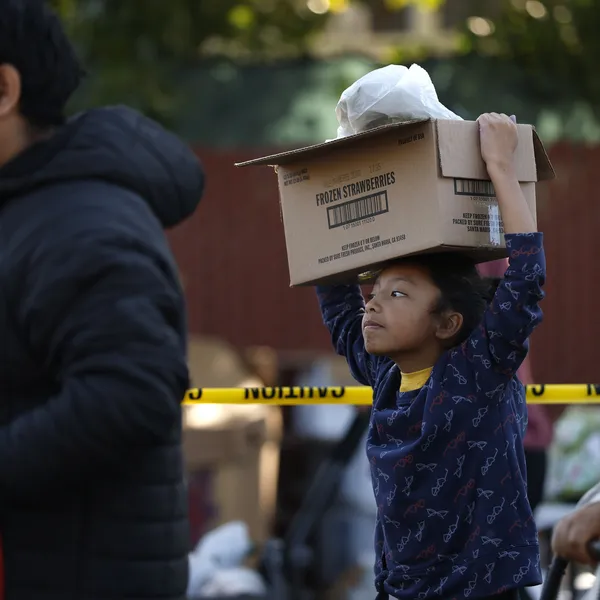None of the Poor Children Matter
Officials in Clearwater, Fla., are working diligently to put the hungry in their place. In this case that place is eight miles out of town at a facility near the county jail. The St. Vincent de Paul soup kitchen is -- according to the well fed elitists running the town -- "enabling" the handout taking behavior of those just looking for a meal.

This practice of the "haves banishing the have-nots" to the hinterland is just a part of a trend that is sweeping the country. Clearwater isn't alone in Florida and the practice is spreading to other regions. Philadelphia, Pa., has been in the news recently for their cutting-edge political philosophy that feeding people not only enables them but downright insults them if done in the presence of those who don't need assistance.
A recent Tampa Bay Times article about Clearwater attempts to remind the reader that many of these hungry people are guileless children. Having worked for years with the severely economically disadvantaged -- what I'll refer to henceforth as the poor -- the Times story jolted me instantly.
See, many of the poor aren't just children. No, many folks needing a loving hand are perpetual children. But sadly -- and often -- when developmentally delayed kids age, their parents die off leaving them alone to fend for themselves.
Many of the single women I worked with were permanently and equivalently 10, 11 or 12 years of age. Bonita -- none of the names I'll use here are real -- told me when she showed up homeless at our once majestic hotel-turned-shelter, that she'd always wanted to live in a great big house with high ceilings and long stairways, but she didn't know it would have so many homeless people in it.
You laugh or you cry in that line of work. Some days you do both.
But the woman I thought of first when I read of the Clearwater hardheartedness was Joan.
Joan -- a pretty woman in her mid-thirties with long straight blonde hair -- became homeless when she was released from jail. Everything about Joan was simple. She dressed simply, she collected baby items, if she had a book, she read it methodically and out loud, and she ate hot dogs nearly every day of her life. Every day that she had the resources to prepare her own meal -- that is, if Joan ate something different, it was because the local soup kitchen or church had prepared it for her.
With a hundred or more people at the shelter on any given night, I didn't interface with everyone. Some folks came and went without my ever meeting them. Joan came to my attention because the commonwealth had initiated proceedings to terminate her parental rights.
Joan's baby was about 12 months old and the foster parents wanted the way cleared to adopt the little girl. The court system was about to decide that the permanent little girl, Joan, would never see her healthy baby again. There would be no attempt to keep the baby in Joan's life because Joan's intellectual age, her welfare, her psyche, and her future were deemed not as important as her baby's.
It didn't help that Joan's recent past was working against her. The man who fathered her baby -- a predatory act that goes unrecognized as such because Joan is technically not a child -- had given her bank account cards to sign. Bruno then used the account he opened in Joan's name to kite bad checks. Joan was picked up and charged with the crime.
Neither the public defender nor the prosecutor focused on Joan's intellectual inability to conceive and commit the crime. Joan was convicted and sent to jail.
When I met Joan, she was crying about the loss of her baby girl. I couldn't really understand what had happened so I asked if she had some paperwork pertaining to the adoption. She had the letter in her back pocket. Joan kept every important paper in her back pocket. Alongside the notifications from the Department of Children and Youth, Joan kept a worn dog-eared document. I asked her to show me all the papers and she told me that I didn't need that fancy rumpled paper. It didn't have anything to do with her troubles. After all, it was just her mom's death certificate.
Joan's mom died about a year before Joan's troubles began. Her pregnancy, jail time and homelessness began after her once life-long guardian was no longer there to protect her.
A couple of days ago I called the National Coalition for the Homeless. I told them that I couldn't find statistics for the number of developmentally delayed adults living on the street. They told me that they didn't have numbers either.
Seems the permanent children are not counted, not remembered, not consequential. That is, they aren't to anyone but folks like St. Vincent de Paul in Clearwater: They and all the other organizations that feed or house folks without question or concern for where they come from. But if the well-fed elitists get their way, that too will end and the children -- young and old -- will go hungry.
An Urgent Message From Our Co-Founder
Dear Common Dreams reader, The U.S. is on a fast track to authoritarianism like nothing I've ever seen. Meanwhile, corporate news outlets are utterly capitulating to Trump, twisting their coverage to avoid drawing his ire while lining up to stuff cash in his pockets. That's why I believe that Common Dreams is doing the best and most consequential reporting that we've ever done. Our small but mighty team is a progressive reporting powerhouse, covering the news every day that the corporate media never will. Our mission has always been simple: To inform. To inspire. And to ignite change for the common good. Now here's the key piece that I want all our readers to understand: None of this would be possible without your financial support. That's not just some fundraising cliche. It's the absolute and literal truth. We don't accept corporate advertising and never will. We don't have a paywall because we don't think people should be blocked from critical news based on their ability to pay. Everything we do is funded by the donations of readers like you. Will you donate now to help power the nonprofit, independent reporting of Common Dreams? Thank you for being a vital member of our community. Together, we can keep independent journalism alive when it’s needed most. - Craig Brown, Co-founder |
Officials in Clearwater, Fla., are working diligently to put the hungry in their place. In this case that place is eight miles out of town at a facility near the county jail. The St. Vincent de Paul soup kitchen is -- according to the well fed elitists running the town -- "enabling" the handout taking behavior of those just looking for a meal.

This practice of the "haves banishing the have-nots" to the hinterland is just a part of a trend that is sweeping the country. Clearwater isn't alone in Florida and the practice is spreading to other regions. Philadelphia, Pa., has been in the news recently for their cutting-edge political philosophy that feeding people not only enables them but downright insults them if done in the presence of those who don't need assistance.
A recent Tampa Bay Times article about Clearwater attempts to remind the reader that many of these hungry people are guileless children. Having worked for years with the severely economically disadvantaged -- what I'll refer to henceforth as the poor -- the Times story jolted me instantly.
See, many of the poor aren't just children. No, many folks needing a loving hand are perpetual children. But sadly -- and often -- when developmentally delayed kids age, their parents die off leaving them alone to fend for themselves.
Many of the single women I worked with were permanently and equivalently 10, 11 or 12 years of age. Bonita -- none of the names I'll use here are real -- told me when she showed up homeless at our once majestic hotel-turned-shelter, that she'd always wanted to live in a great big house with high ceilings and long stairways, but she didn't know it would have so many homeless people in it.
You laugh or you cry in that line of work. Some days you do both.
But the woman I thought of first when I read of the Clearwater hardheartedness was Joan.
Joan -- a pretty woman in her mid-thirties with long straight blonde hair -- became homeless when she was released from jail. Everything about Joan was simple. She dressed simply, she collected baby items, if she had a book, she read it methodically and out loud, and she ate hot dogs nearly every day of her life. Every day that she had the resources to prepare her own meal -- that is, if Joan ate something different, it was because the local soup kitchen or church had prepared it for her.
With a hundred or more people at the shelter on any given night, I didn't interface with everyone. Some folks came and went without my ever meeting them. Joan came to my attention because the commonwealth had initiated proceedings to terminate her parental rights.
Joan's baby was about 12 months old and the foster parents wanted the way cleared to adopt the little girl. The court system was about to decide that the permanent little girl, Joan, would never see her healthy baby again. There would be no attempt to keep the baby in Joan's life because Joan's intellectual age, her welfare, her psyche, and her future were deemed not as important as her baby's.
It didn't help that Joan's recent past was working against her. The man who fathered her baby -- a predatory act that goes unrecognized as such because Joan is technically not a child -- had given her bank account cards to sign. Bruno then used the account he opened in Joan's name to kite bad checks. Joan was picked up and charged with the crime.
Neither the public defender nor the prosecutor focused on Joan's intellectual inability to conceive and commit the crime. Joan was convicted and sent to jail.
When I met Joan, she was crying about the loss of her baby girl. I couldn't really understand what had happened so I asked if she had some paperwork pertaining to the adoption. She had the letter in her back pocket. Joan kept every important paper in her back pocket. Alongside the notifications from the Department of Children and Youth, Joan kept a worn dog-eared document. I asked her to show me all the papers and she told me that I didn't need that fancy rumpled paper. It didn't have anything to do with her troubles. After all, it was just her mom's death certificate.
Joan's mom died about a year before Joan's troubles began. Her pregnancy, jail time and homelessness began after her once life-long guardian was no longer there to protect her.
A couple of days ago I called the National Coalition for the Homeless. I told them that I couldn't find statistics for the number of developmentally delayed adults living on the street. They told me that they didn't have numbers either.
Seems the permanent children are not counted, not remembered, not consequential. That is, they aren't to anyone but folks like St. Vincent de Paul in Clearwater: They and all the other organizations that feed or house folks without question or concern for where they come from. But if the well-fed elitists get their way, that too will end and the children -- young and old -- will go hungry.
Officials in Clearwater, Fla., are working diligently to put the hungry in their place. In this case that place is eight miles out of town at a facility near the county jail. The St. Vincent de Paul soup kitchen is -- according to the well fed elitists running the town -- "enabling" the handout taking behavior of those just looking for a meal.

This practice of the "haves banishing the have-nots" to the hinterland is just a part of a trend that is sweeping the country. Clearwater isn't alone in Florida and the practice is spreading to other regions. Philadelphia, Pa., has been in the news recently for their cutting-edge political philosophy that feeding people not only enables them but downright insults them if done in the presence of those who don't need assistance.
A recent Tampa Bay Times article about Clearwater attempts to remind the reader that many of these hungry people are guileless children. Having worked for years with the severely economically disadvantaged -- what I'll refer to henceforth as the poor -- the Times story jolted me instantly.
See, many of the poor aren't just children. No, many folks needing a loving hand are perpetual children. But sadly -- and often -- when developmentally delayed kids age, their parents die off leaving them alone to fend for themselves.
Many of the single women I worked with were permanently and equivalently 10, 11 or 12 years of age. Bonita -- none of the names I'll use here are real -- told me when she showed up homeless at our once majestic hotel-turned-shelter, that she'd always wanted to live in a great big house with high ceilings and long stairways, but she didn't know it would have so many homeless people in it.
You laugh or you cry in that line of work. Some days you do both.
But the woman I thought of first when I read of the Clearwater hardheartedness was Joan.
Joan -- a pretty woman in her mid-thirties with long straight blonde hair -- became homeless when she was released from jail. Everything about Joan was simple. She dressed simply, she collected baby items, if she had a book, she read it methodically and out loud, and she ate hot dogs nearly every day of her life. Every day that she had the resources to prepare her own meal -- that is, if Joan ate something different, it was because the local soup kitchen or church had prepared it for her.
With a hundred or more people at the shelter on any given night, I didn't interface with everyone. Some folks came and went without my ever meeting them. Joan came to my attention because the commonwealth had initiated proceedings to terminate her parental rights.
Joan's baby was about 12 months old and the foster parents wanted the way cleared to adopt the little girl. The court system was about to decide that the permanent little girl, Joan, would never see her healthy baby again. There would be no attempt to keep the baby in Joan's life because Joan's intellectual age, her welfare, her psyche, and her future were deemed not as important as her baby's.
It didn't help that Joan's recent past was working against her. The man who fathered her baby -- a predatory act that goes unrecognized as such because Joan is technically not a child -- had given her bank account cards to sign. Bruno then used the account he opened in Joan's name to kite bad checks. Joan was picked up and charged with the crime.
Neither the public defender nor the prosecutor focused on Joan's intellectual inability to conceive and commit the crime. Joan was convicted and sent to jail.
When I met Joan, she was crying about the loss of her baby girl. I couldn't really understand what had happened so I asked if she had some paperwork pertaining to the adoption. She had the letter in her back pocket. Joan kept every important paper in her back pocket. Alongside the notifications from the Department of Children and Youth, Joan kept a worn dog-eared document. I asked her to show me all the papers and she told me that I didn't need that fancy rumpled paper. It didn't have anything to do with her troubles. After all, it was just her mom's death certificate.
Joan's mom died about a year before Joan's troubles began. Her pregnancy, jail time and homelessness began after her once life-long guardian was no longer there to protect her.
A couple of days ago I called the National Coalition for the Homeless. I told them that I couldn't find statistics for the number of developmentally delayed adults living on the street. They told me that they didn't have numbers either.
Seems the permanent children are not counted, not remembered, not consequential. That is, they aren't to anyone but folks like St. Vincent de Paul in Clearwater: They and all the other organizations that feed or house folks without question or concern for where they come from. But if the well-fed elitists get their way, that too will end and the children -- young and old -- will go hungry.

